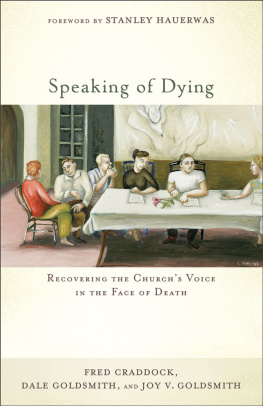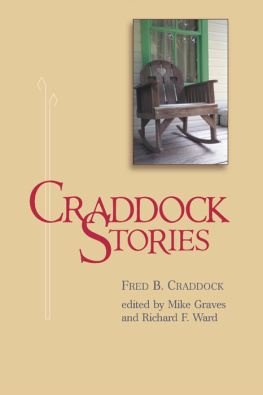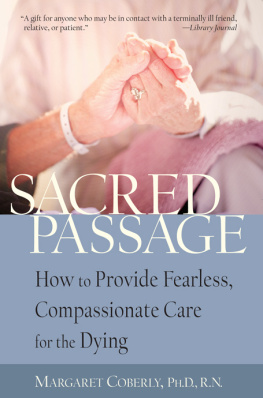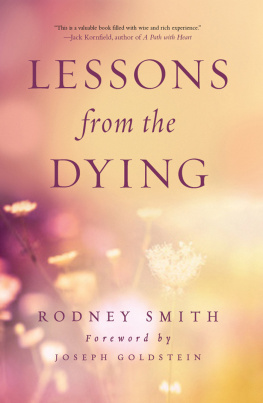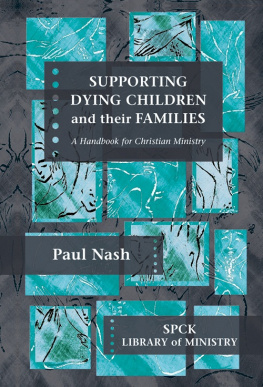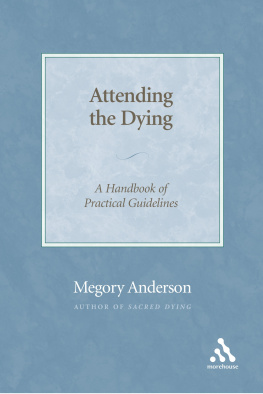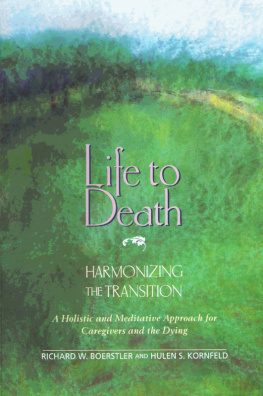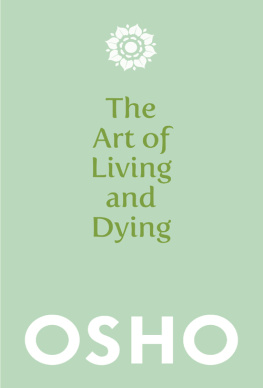
2012 by Fred Craddock, Dale Goldsmith, and Joy V. Goldsmith
Published by Brazos Press
a division of Baker Publishing Group
P.O. Box 6287, Grand Rapids, MI 49516-6287
www.brazospress.com
Ebook edition created 2012
All rights reserved. No part of this publication may be reproduced, stored in a retrieval system, or transmitted in any form or by any meansfor example, electronic, photocopy, recordingwithout the prior written permission of the publisher. The only exception is brief quotations in printed reviews.
ISBN 978-1-4412-3881-8
Library of Congress Cataloging-in-Publication Data is on file at the Library of Congress, Washington, DC.
Unless otherwise indicated, Scripture quotations are from the New Revised Standard Version of the Bible, copyright 1989, by the Division of Christian Education of the National Council of the Churches of Christ in the United States of America. Used by permission. All rights reserved.
Scripture quotations labeled NIV are from the Holy Bible, New International Version. NIV. Copyright 1973, 1978, 1984, 2011 by Biblica, Inc. Used by permission of Zondervan. All rights reserved worldwide. www.zondervan.com
The excerpt from Miguel de Unamunos The Christ of Velzquez on page 152 is taken from Eleanor L. Turnbull, trans., Miguel de Unamuno, The Christ of Velzquez , p. 119. 1951 The Johns Hopkins Press. Reprinted with permission of The Johns Hopkins University Press.
Because of Rev. Janet Forts Goldsmith (19682002)our daughter, sister, student
Contents
Tables
Foreword
T hey had not expected him to die. He was in the critical-care unit of the hospital in a city some distance from where they lived, so they knew he was very sick. But they did not think he was going to die anytime soon. They traveled to see him, assuming that he would at least for a time get better. As soon as they walked into his room in the hospital, however, it was clear he was dying. The struggle he faced helped those who loved him to recognize that the medical interventions were only prolonging the inevitable.
Moreover, he was being forced to breathe, making impossible any communication between him and his family. If a nurse had not been present to help the family understand that he was suffering from an illness from which he would not recover, he would have died without interacting with his family. The intervention of the nurse made it possible for his therapy to be revised, which meant he could receive the love of his family, family members could pray for him, and he knew he would not die alone. He soon died, surrounded by those who represented how his story reflected a Christian life.
I was a witness to this death. It was not long after my involvement with this death that I was asked to write the foreword to Speaking of Dying . Reading through the book, I could only think how much it is needed given what I had just witnessed. There is simply no question that too often we lack the words necessary to speak to one another about dying and death. Death threatens speech, often reducing us to silence. There can be a silence whose eloquence is a form of prayer, but too often the silence surrounding death is little more than noisy platitudes we are not sure are even true. He or she is in a better place tries to comfort, but it does so by denying the reality of death itself.
As the authors of this book document through paying close attention to the lives of ministers who are dying, it seems that Christians have lost our ability to speak of dying with one another. The essential storythe story of the life, death, and resurrection of Christthat should form our dying as well as our living as Christians seems to have been lost. The authors no doubt are right to suggest that the way our dying has become the province of medicine may be one of the reasons Christians have lost our ability to speak of death. That another procedure always seems possible too often results in a person dying without being able to have his or her dying storied by the story of the church. It would be a mistake, however, to blame those associated with medicine for this result. As the authors make clear, Christians have only themselves to blame for losing the story that should make it possible to speak of death.
Take, for example, something as simple and significant as where the funeral is to take place. The authors rightly note that this is not a book about funerals; however, funerals often reflect how we have or have not learned to speak about death. The person whose death I witnessed had left instructions for his funeral to take place in a funeral home. As a result, the liturgy was less than it should have been, and it failed to reflect his many years of faithful attendance at his church. Somehow he had not been formed by the church to recognize the relationship between his baptism and his death. So those gathered at his funeral became an audience rather than a congregation.
I am, perhaps, particularly sensitive to the connection between baptism and the funeral because of the practice of my church. We have a cross-shaped baptismal that is sufficiently large to immerse not only children but adults. When one of our members dies, the coffin is placed on the baptismal the night before the funeral. We then take turns keeping vigil with our dead brother or sister through the night until the funeral is held. The connection so established between baptism and the funeral has made it possible for the church to speak about death in quite remarkable ways.
I am not suggesting that this church always gets it right, but rather I am calling attention to the fact that the small act of displaying the connection between baptism and death turns out to be one of the most significant defining characteristics of this church. This simple action seems to have unleashed the kind of speech this book suggests we desperately need if we are to speak truthfully of death. As these authors argue, the death of Jesus means Christians have a storied death that enables us to speak to one another about our dying. It may well be, therefore, that one of the most determinative witnesses Christians can make in our time is to be a people who know how to speak of dying.
Particularly noteworthy is the authors suggestion that Christians have the psalms of lament as a resource to shape our dying. These authors rightly distance themselves from those who attempt to make death a spiritual experience. Drawing on Arthur McGills great work on death, they remind us that we cannot experience our own deaths, but we can recognize that we need to die in order to discover our true selves. Therefore, death is properly lamented, but also celebrated as new life.
This is a book we have desperately needed. I hope it will become a book widely studied in congregations and seminaries. We must learn to speak of dying. This book appropriately helps us recover our voices as a people taught to speak by the one who died on a cross.
Stanley Hauerwas
Preface
I selfishly claim to have known my sister better than anyone else did. She was a pastor, and in her desperate time of degradation and lossin the midst of a congregation and governing body unable to engage the subject of her dying constructivelyI observed a train wreck. The experience changed my entire life. I turned from an academic career in the theatre to the world of uncertainty, anxiety, and fear heard in the communication of dying patient to caregiver, dying patient to clinician, dying patient to God.
I was Janets caregiver during a nine-month experience with adenocarcinoma of unknown primary. From my view (as caregiver), her dying in the church, while working full-time, then part-time, but never not working, was a debacle. A devastation. A secret. An unspeakable thing.

